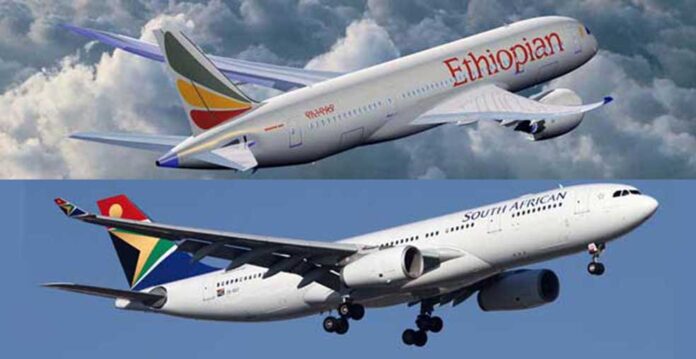In proactive move to settle accumulated trapped funds, President Bola Tinubu has directed the Central Bank of Nigeria (CBN) to create a platform for quarterly reconciliatory meetings with foreign airlines.
Minister of Aviation and Aerospace Development, Festus Keyamo, disclosed this in Abuja at the ongoing African Aviation Summit.
He noted that the development was one of the reasons President Tinubu travelled to the United Arab Emirates (UAE) to address.
He expressed his displeasure with the trapped funds of foreign airlines in Nigeria Before the Minister’s directive, foreign airlines had found it difficult to get their funds due to Nigeria’s foreign exchange (forex) policy.
Keyamo, while stating that he believes that a proactive approach is necessary to find a lasting solution to the issues, added that the Federal Government was also addressing the challenges associated with forex supply, which resulted in the huge sum of money being owed foreign airlines.
He said: “The current administration is aware that one of the setbacks entrepreneurs have suffered in Nigeria in recent years is the fluctuation of forex and its availability.
“This administration is committed to ensuring that forex is readily available to entrepreneurs and I have directed that the CBN hold quarterly reconciliation meetings with a view to resolving this issue.”
He also noted that President Tinubu was on Monday in the UAE to resolve the issue of blocked funds, among other issues.
The Minister also unveiled three roadmap projects, which include Aerotropolis, Aircraft Leasing Company (ALC), and Maintenance Repair and Overhaul (MRO) facility.
He further unveiled five focus areas to realise the country’s vision of becoming an aviation hub in Nigeria. The key areas listed include infrastructure upgrade, ALC, MRO facility and forex availability.
“Government welcomes major players in aircraft leasing and lessors to invest in Nigerian airlines to provide state of the art aircraft. The government will ensure the enforcement of contract agreements and the rights of investors and indeed all parties are protected and Nigeria being a signatory to the Cape Town Convention will uphold international obligations.
“Also, CBN is open to providing tax holidays to encourage existing and new entrants into the aviation sector. I wish to reiterate that this administration will continue to sustain the support given to the industry.
“MRO facility is another critical aspect that can make the Nigerian aviation industry a hub on the continent. With the shortage of qualified engineers, the current administration is willing to provide all the necessary support for the establishment of world-class MROs and training organisations.”
Meanwhile, the International Air Transport Association (IATA) has criticised Nigeria over multiple charges imposed on airlines operating in the country.
The global trade body representing the airline industry recently queried the Federal Government for not being responsive to the foreign airlines’ inability to repatriate their funds in excess of $800 million.
In Nigeria, foreign airlines collect Naira for their tickets to customers and exchange the same for foreign currencies for their operations, but they have been faced with their inability to get the exchange executed through the official foreign exchange market due to the scarcity of forex resources.
This development had forced the UAE’s flag carrier, Emirates Airlines, to suspend its operations in the country. It was also responsible for the move by the airlines to close down their lower fair inventory to travelling agents across Nigeria, denying them access to issuing tickets emanating from other countries into Nigeria in a bid to reduce the backlog.
IATA’s Vice president, Africa and Middle East, Kamil Al-Alwadi, who spoke at the ongoing African Aviation Summit, identified about 27 charges imposed on airlines by the Federal Government.
The body also ranked Nigeria highest on airport charges in Africa, with Nnamdi Azikiwe International Airport, Abuja, topping the ‘most expensive’ list, closely followed by Murtala Muhammed International Airport, Lagos.
Al-Awadhi berated Nigerian authorities for stifling airline operations with heavy and sundry taxes and charges. Lamenting the stunted growth in the region, especially Nigeria, he called on the Federal Government to create an environment conducive to successful airline operations.
“In a recent research, we discovered that the most expensive airport in Africa is Abuja airport, followed by Lagos airport. With all these exorbitant charges, Nigerian airlines can’t compete with their foreign counterparts. Africa has put itself in a place where it cannot help its own, battling issues like expensive fuel, excessive charges, leasing and insurance.
“Airlines need to be financially viable too. They contribute to the country’s GDP. Nigeria needs to decide what to do for them to survive.”
He said carriers based in Africa, who were expected to generate a moderate profit, had a combined loss of around $484 million in 2023 because the continent remains a difficult market, even as economic, infrastructure and connectivity challenges impact the industry’s performance.
Al-Awadhi said: “ As we saw in the second quarter of 2023 – and for two consecutive quarters – African carriers had one of the world’s highest annual passenger traffic growth rates, second only to Asia Pacific.
“With total traffic up 38.9 per cent, compared to the same quarter in 2022, African carriers’ growth outperformed the industry-wide average for total and international traffic, even though the region has not fully recovered to pre-pandemic levels.
“Despite this continued positive performance, the region still confronts economic challenges that severely limit affordability of air travel, in addition to a range of infrastructure issues that curb capacity and hinder development of consistent air service.
“The continent stands out as the region with the greatest potential and opportunity for aviation. But this potential is limited by safety incidents, infrastructure constraints, blocked funds, high costs, lack of connectivity, regulatory impediments, slow adoption of global standards, and skills shortages.




